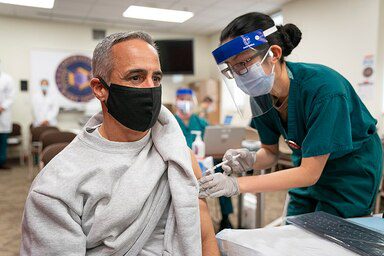 Senior Enlisted Advisor to the Chairman (SEAC) Ramon “CZ” Colon-Lopez receives a COVID-19 vaccine at Walter Reed National Military Medical Center, Bethesda, Md., Dec. 21, 2020. (DOD Photo by Navy Petty Officer 1st Class Carlos M. Vazquez II).
Senior Enlisted Advisor to the Chairman (SEAC) Ramon “CZ” Colon-Lopez receives a COVID-19 vaccine at Walter Reed National Military Medical Center, Bethesda, Md., Dec. 21, 2020. (DOD Photo by Navy Petty Officer 1st Class Carlos M. Vazquez II).
But the one, dim light at the end of the tunnel in Marin and beyond – Moderna and Pfizer vaccines that are “essentially 100 percent effective against serious disease,” says Dr. Paul Offit, the director of the Vaccine Education Center at Children’s Hospital of Philadelphia – shouldn’t feel so dim, say many health experts, according to an uplifting report in Monday’s New York Times.
According to the Times report, much of the current public discussion of the vaccines is full of warnings about their limitations: “They’re not 100 percent effective. Even vaccinated people may be able to spread the virus. And people shouldn’t change their behavior once they get their shots. These warnings have a basis in truth, just as it’s true that masks are imperfect. But the sum total of the warnings is misleading, as I heard from multiple doctors and epidemiologists last week.”
“It’s driving me a little bit crazy,” Dr. Ashish Jha, dean of the Brown School of Public Health, told the Times. “We’re underselling the vaccine,” said Dr. Aaron Richterman, an infectious-disease specialist at the University of Pennsylvania, added. “It’s going to save your life — that’s where the emphasis has to be right now,” added Dr. Peter Hotez of the Baylor College of Medicine said.
The reason the vaccine is being undersold at the moment is that many health experts — just as they did early in the pandemic when they decided that the public could not be trusted to hear the truth about masks in the U.S. and around the world — don’t seem to trust the public to hear the full truth.
That truth, according to the report, is that the “Moderna and Pfizer vaccines — the only two approved in the U.S. — are among the best vaccines ever created, with effectiveness rates of about 95 percent after two doses. That’s on par with the vaccines for chickenpox and measles. And a vaccine doesn’t even need to be so effective to reduce cases sharply and crush a pandemic. If anything, health experts say, the 95 percent number understates the effectiveness, because it counts anyone who came down with a mild case of Covid-19 as a failure. But turning Covid into a typical flu — as the vaccines evidently did for most of the remaining 5 percent — is actually a success. Of the 32,000 people who received the Moderna or Pfizer vaccine in a research trial, just one contracted a severe Covid case.
Some Bay Area Bumps in the Road
Despite the optimism at the federal level, local health officials are seeing some concerning data, as some staffers at Marin County’s three hospitals have decided not to get the shots, according to the Marin IJ. The report indicates that roughly 30% of the employees at at MarinHealth Medical Center in Greenbrae have declined the vaccination as of Jan. 13, with “a fair number of women of childbearing age who have the misconception that it could cause some amount of infertility or early pregnancy loss,” Karin Shavelson, chief medical officer at MarinHealth Medical Center in Greenbrae, told the IJ. At Novato Community Hospital, about 25% of the employees had declined to be vaccinated, while a spokesperson for Kaiser Permanente’s San Rafael Medical Center declined to say what percentage of the employees chose to be vaccinated.
As of Jan. 14, Marin’s vaccination distribution remains focused on Tier 1A, which distributes vaccines only to only health care workers, including hospital employees, paramedics and emergency medical technicians (EMTs), skilled nursing and long-term care facility employees, home health care workers, mental health providers, dentists, specialty clinics workers, outpatient/private practice workers, etc. Health care workers who are eligible for a vaccine can register for an appointment here.
In the coming days, Marin will move into the first tier of Phase 1B, which includes individuals 65 and older as well as individuals working in the following fields: education, childcare, food service and agriculture workers and emergency services.

